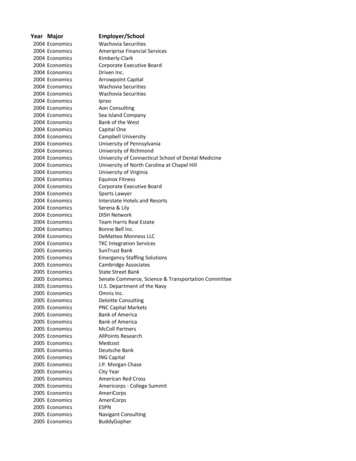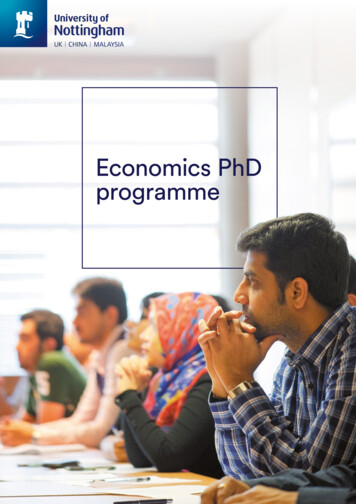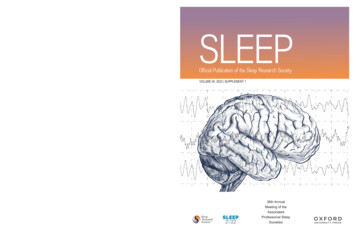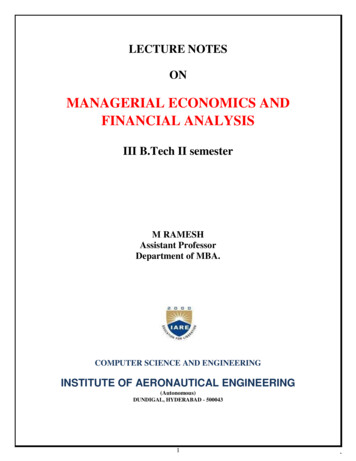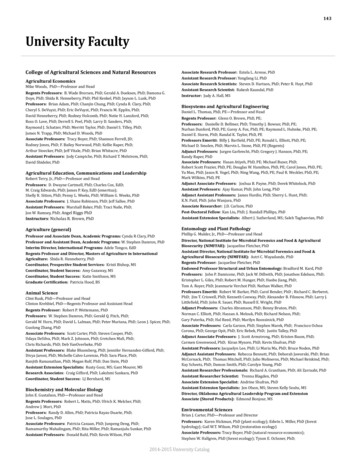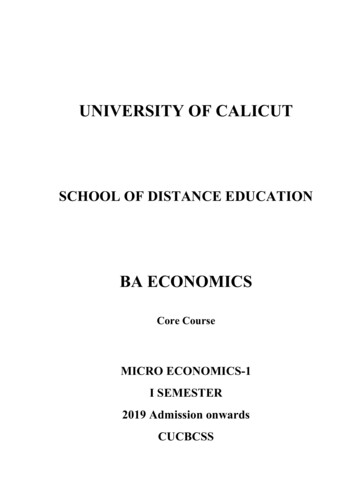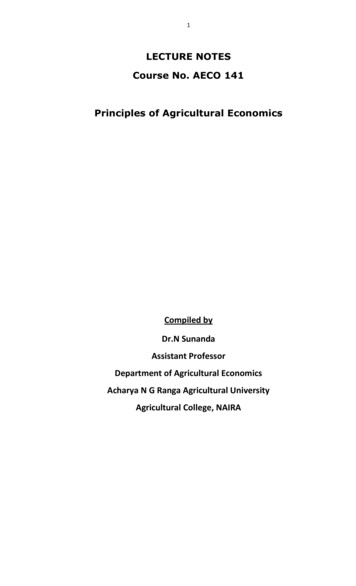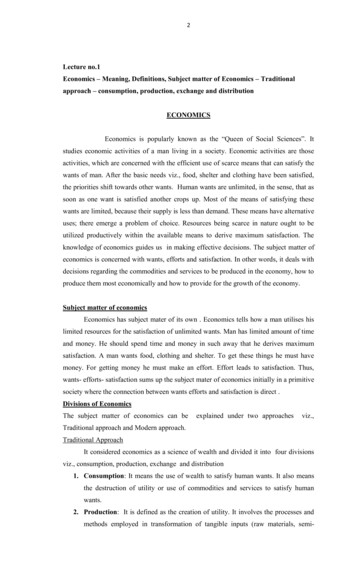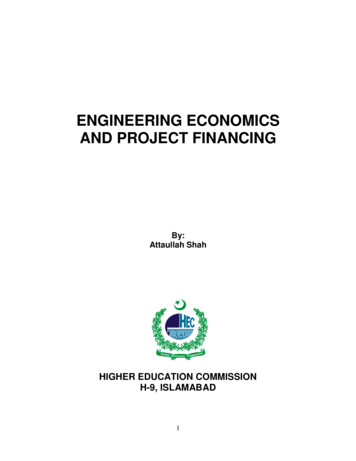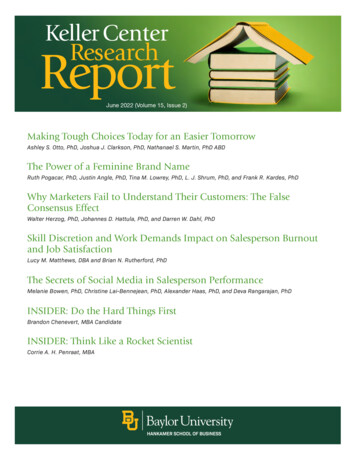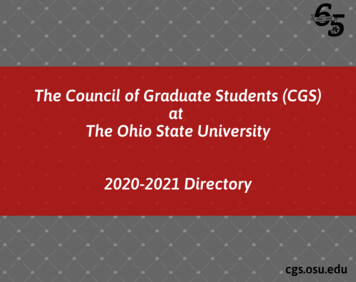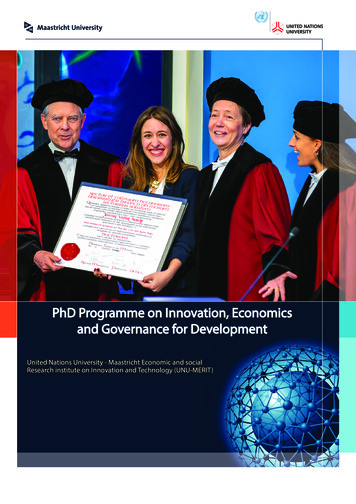
Transcription
PhD Programme on Innovation, Economicsand Governance for DevelopmentUnited Nations University - Maastricht Economic and socialResearch institute on Innovation and Technology (UNU-MERIT)
ContentsPhD Programme on IEGD3The Programme4Course Descriptions5Second Term Elective Courses7 Programme Summary The Host Institute Training Programme Calendar 2019-20 The Economics of Innovation Programme and Policy Evaluation The Governance of Development as a Complex Social System Leveraging Technology and Innovation for the SustainableDevelopment Goals (SDGs) (Socio-) Economic DevelopmentThe DissertationTeaching and Research8Profile and Prospects9Practical Information10Part-time PhD Programme11 Teaching Methods Language Skills Trainings Research Activities Research Community Brochures International Profile Key Lecturers Student Profile Career Prospects AdmissionsApplyingTuition FeesScholarshipsMaastricht University is a signatory of the “Code of conduct withrespect to international students in Dutch Higher Education”.More information about this code of conduct is available atwww.internationalstudy.nl
PhD Programme on Innovation, Economics and Governance for DevelopmentProgramme SummaryThis multidisciplinary PhD programme is offered by theUnited Nations University - Maastricht Economic andsocial Research institute on Innovation and Technology(UNU-MERIT).The programme provides advanced training in theknowledge and skills most relevant to the economicsof technology, migration and innovation, and to governance, social protection and public policy analysis.While built around a common core of courses dealingwith the economics of innovation and development,the programme also offers specialised elective coursesin governance, public policy and the economics oftechnology.Our programme trains fellows to become scholars andpractitioners in the fields of the economics of technology and of governance broadly conceived. Bothcoursework and research in the institute are aimed atsocially relevant knowledge, with a focus on development and sustainability, working through innovation,social protection and migration.A core objective is to create a critical mass of researchers specialised in economics and governance of innovation and technical change, but also social protection,migration, social policy, and development. Our graduates become leading researchers in the field and areable to provide advice based on sound results. OurPhD Programme on Innovation, Economics andGovernance for Development (IEGD) is a four-year,Maastricht-based programme starting in Septembereach year. It is taught entirely in English. MaastrichtUniversity awards the doctoral degree upon successfuldefence of the thesis.During the first year fellows complete basic compulsory training to lay a foundation for their futureresearch. There are also elective courses that engagefellows in the topics in which the institute specialises.These courses vary from year to year depending on theinterest of the fellows and faculty.3UNU-MERIT 2019-2020The first year ends by writing a thesis proposal, whichis presented to the institute at the end of the academicyear. Successful completion of the first year is followedby dissertation research and writing.Students pursue a wide variety of dissertation topicsfitting into any of the institute’s eight research themes:1. The Economics of Knowledge and Innovation2. Social Protection, Inclusive Innovation andDevelopment3. Economic Development, Innovation, Governanceand Institutions4. Sustainable Development, Innovation and SocietalTransitions5. Innovation Systems Indicators and Policy6. Migration and Development7. ICT-enabled Innovation and SocietalTransformations8. Population, Development and Labour EconomicsThe Host InstituteUNU-MERIT is a research and training institute ofUnited Nations University (UNU) based in the south ofthe Netherlands, which collaborates closely withMaastricht University.The institute’s research mission is to provide newinsights into the economic, social and political aspectsof growth and development in local and internationalcontexts. Its research and training programmesaddress a broad range of questions including the economics of technology and innovation, multi-levelgovernance, intellectual property protection, socialprotection policy, knowledge creation and diffusion,and migration.Researchers at UNU-MERIT are internationally recognised for their contributions to the understanding ofthe economic, political, social and philosophical foundations of the processes of technical change. The institute also has a history of project implementation forinternational institutions such as the World Bank,UNICEF, UNDP, ILO and national governments.
The ProgrammeOur PhD programme provides advanced training inthe knowledge and skills relevant not only to basicresearch in a variety of fields linked to economics,technology and governance, but also to policyanalysis including policy design, policy monitoringand policy evaluation.PhD fellows follow individualised plans that outlinethe requirements for completion of the programme.These plans take into account their research interestsand their educational and professional backgrounds.They are agreed upon with the programmecommittee at the start of the course and with thesupervisory team in subsequent years of theprogramme.Training ProgrammeDuring the first year, fellows complete a basiccompulsory training programme conducted bymembers of our faculty. The courses are spread acrosstwo semesters and taught in Maastricht.The first semester consists of a course programme tobe taken by all fellows. In the second semester, weoffer a menu of elective courses and fellows buildtheir own programme, focussed on different aspectsof innovation, social protection or migration. At theend of the first year, fellows defend a thesis proposal,following which they spend three years writing a PhDdissertation, leading to a PhD at Maastricht University.Calendar 2019-20Introduction week and microeconomics course1 Sep. 20192 Sep. 2019 20 Dec. 2019Economics ofinnovationPolicy evaluationGovernance ofdevelopment as acomplex social system21 Dec. 2019 6 Jan. 2020Winter break20 Jan. 2019 31 March 2020Specialisation coursesLeveraging technologyand innovation for theSustainable DevelopmentGoals(Socio) EconomicDevelopment4
Course DescriptionsThe Economics of Innovationtechnology spillovers. Economic structure andmigration. Technology transfer.Here we sketch nine topics / sessions for the courseon the economics of innovation. The nine topics areselected on the basis of two criteria. First, they providea coherent story of the role that innovation plays ineconomic development, i.e., when seen as a set theyprovide students with a UNU-MERIT view on ‘innovation’.Second, the topics are chosen for the opportunities theyprovide for linkages to other research themes in theinstitute, and, as a logical consequence, to the otherPhD courses in the first or second semester.Regions and cities: Geography of innovation:industrialisation and de-industrialisation; economicmigration. Inventors and researchers: measuring andexplaining output; co-operation networks; migration ofhigh-skilled labour. Cities: Jacobs vs. Marshallexternalities; the Triple Helix; academicentrepreneurship.Each topic, listed below, consists of a number of subtopics.We start with the basics: How does innovation interactwith the economy? various models of innovation;technological paradigms and trajectories; long wavesand (economic) history. Microeconomic principles:equilibrium and optimisation versus disequilibrium andevolution theories.Sustainability and innovation: Circular economy:engineering and waste; NIMEA accounts; the sharingeconomy.We turn to the global picture: Economic developmentand international diffusion of knowledge; structuralchange and international trade; absorptive capacity andcountry capabilities; global value chains. Sustainabilityand energy transitions: large technological systems;transition theory and policy; clean energy and thelocation of production and consumption.How do we know whether (public) policies orprogrammes work for development? For example, doesbusiness training improve business outcomes? What isthe role of networks in adopting new products ortechnologies? Do R&D subsidies improve private R&Dspending? Rigorous evidence on these issues helps tobetter design and target new programmes and policies.Innovation systems: Actors and roles: the CommunityInnovation Survey and firm innovation activities; science,technology and innovation policy; the system ofResearch and Development (R&D). Localised interaction:University-industry interaction; local economic impact ofuniversities; why innovation clusters; types of localinnovation clusters; smart specialisation.The main objective of the course is to build problemsolving and research skills for evidence-basedinterventions and policies, with a focus on developingand transition economies.Development or a lack of it: The developmental state:Asian tigers; technology gap model; global value chains.Latin American: the structural model; balance-ofpayments restricted growth. Agriculture: the greenrevolution; diffusion of agricultural knowledge; IPRs.Inclusive innovation: bottom of the pyramid;entrepreneurship and micro credit; sanitation and basicnecessities.Innovation, labour markets and inequality: Development,employment, inequality: empirical regularities;theoretical underpinning. Product and processinnovation: effects on employment; general equilibriumand labour supply models; skills biases and structuralunemployment. Automation: employment impacts;innovation and (soft) skills. The global picture: trade vs.technology for explaining outsourcing; local labourmarkets and the China effect. Developing countries:formal and informal sectors and decent employment;international trade and the living wage.Innovation and the international movement ofproduction factors: Technology-based explanations oftrade: basic trade models; extensive and intensivemargins; technology gap adjustment theory. Sociologyof global value chains. Foreign direct investment and5Public Policy: Indicators for policymaking: the EUscoreboard; Lisbon process. Motivations for policy:market-failure and systems failure; types of policy.Industrial policy: historical experiences and a newfashion.UNU-MERIT 2019-2020Programme and Policy EvaluationStudents will learn the basic intuition behind (quasi)experimental designs including RCTs DID, PSM, IV andreview assumptions and criteria for the validity of eachof these approaches. Students will gain experience indeciding which approach(es) are most appropriate for agiven research question and context. We will draw onseveral empirical applications in class, and learn aboutchallenges and potential pitfalls in conductingsuccessful impact evaluations in practice. STATAtutorials will help students familiarise themselves withanalysing quantitative datasets to assess the impact of apolicy or programme using (quasi)experimentalmethods.After successful completion of this course students areexpected to be able to: Compare and understand quantitative impactassessment methods; Analyse and interpret existing impact assessments inrelation to theory and policy objectives including theSDGs; Analyse the quality and appraise the policyimplications of impact assessments performed byothers; Design their own impact assessments; Investigate impact assessment using existing studiesand data.
Course DescriptionsThe Governance of Development asa Complex Social SystemThis course offers an introduction to the study ofgovernance of development as a complex social system.The approach of complex social systems emphasises theemergence, evolution and adaptation of constellationscreated by social structures, agents and interactiondynamics among them. This approach aims atcomprehending the heterogeneity of arrangements,relations and causalities shaping developmentaltrajectories at sub-national, national, transnational andinternational levels. By adopting this perspective thecourse will analyse the evolution of key priorities,tendencies and dilemmas of development in academicdebates as well as in policy practice. Therefore, it alsointroduces governance challenges faced during theprocesses of steering and coordination of development.Finally, the course analyses how these dynamics informthe governance of public policy areas by analysinggovernance principles and policy tools. It involves theunderstanding of policy tools choices in addressingdifferent public policy challenges and tasks.Following this basic approach, the course encompassesexamples from different policy areas, includinginnovation systems, health, energy and environment,political regimes in the broader context ofdevelopment. The course will also illustrate how thebasic concepts and analytical perspectives oncomplexity of development can be captured bydifferent methods and tools of analysis (e.g. systemdynamics modelling, network analysis, qualitativecomparative analysis or Q-methodology). However, itwill not be a training in research methods.ObjectivesThis course will contribute to the general objectives ofthe PhD Programme in two aspects. Firstly, it structuresand extends participants’ knowledge aboutdevelopment and its governance dynamics. Secondly, itenhances students’ capacity to analyse policy problemsin the context of complex social systems in an orderedand focused approach. The objectives are accomplishedthrough: The mapping and classification of the main elementsof the governance of development as a complex socialsystem; The advanced understanding of analytical conceptsillustrated by examples from different policy areas; Critical and innovative engagement with the academicdebates about the governance of development.Leveraging Technology andInnovation for the SustainableDevelopment Goals (SDGs)In this course, we will study the evolutionary processesthat are pushing the knowledge frontiers of science,generating new technology and other forms ofinnovation and impacting economic development. Inparticular, we will examine the pathways by which newtechnology and innovation are contributing to theattainment of the Sustainable Development Goals (SDGs).Such an enquiry is important, because for certain problemsthere are no technological solutions at present (i.e. there isa need for innovation), or there are multiple solutions (i.e.choices need to be made) or a solution design for one SDGcan pose short-term or long-term risks for the attainment ofanother (i.e. trade-offs need to be weighed). In this context,governance is key to harnessing the potential of science,technology and innovation for societal welfare. For goodgovernance vis-à-vis technology and innovation, we needto understand the dynamics of actor-group interactionswithin innovation systems and the possible impact ofregulation and incentive design on systemic outcomes. Thechallenges being faced by middle and low incomecountries for the attainment of all the SDGs will be coveredthrough the following lectures. The seminal articles will becovered in the lectures and students will be asked topresent case studies. The 17 SDGs will be covered in thestudent presentations.(Socio-) Economic DevelopmentThe course provides a broad overview of (macro-) economicdevelopment. In particular, the course aims to providestudents – in an integrated framework – with knowledgeon three particular dimensions of economic development:the empirical analysis of (country) developmentexperiences; the theory of economic development; andmajor issues in development economics. The course willbegin with a discussion of: what is meant by economic (andsocial) development; how we measure economic and socialdevelopment (including and beyond per capita GDP); andhow difficult the process of development is (based upon adiscussion of very long-run data and examples of the fewcountries that have been able to develop in the more recentpast). In the introduction we will further discussconvergence and divergence as well as the role of theSustainable Development Goals (SDGs) as a means offraming the discussion of development. The remainder ofthe course will be organised around particulardeterminants of economic development. These include: Technology and innovation; International trade and globalisation; Industry and structural change; The deep determinants of development (Geography andInstitutions); Human Capital; and Urbanisation and internal migration.During the discussion of each of these topics emphasis willbe placed on identifying and understanding both relevantdevelopment theories and empirical evidence and countryexperiences. In addition to obtaining an understanding ofthe major issues of development at the macro level, thecourse will therefore also provide a broad overview ofdifferent development theories and an understanding ofrelevant empirical approaches to address the causes of6
Course Descriptionsdevelopment at the aggregate level. While much of thediscussion of these topics will be on economicindicators such as income per capita, time will be spentidentifying impacts on broader social indicators ofdevelopment, most notably inequality and poverty,with the role of policy in influencing these outcomesalso introduced.Second Term Elective CoursesThe second term consists of a variety of elective courses. Amenu of courses is offered from which fellows selectapproximately four which fit with their research interests.The menu changes from year to year, but a representativelist would include: Innovation in the public sector; Technical change: Economic theory and evolutionarymodelling; Firm-level innovation and learning in developing countries:Technological capabilities, enterprise clusters, global valuechains; Innovation indicators and policy; Economics and econometrics of innovation Uncovering causality in innovation processes andoutcomes Microeconomics of development: Theory, evidence andpolicy; Entrepreneurship in developing countries; Access to justice as a means to promote the rule of law; Economics of networks; Political violence and human development; Organisational economics; Migration: Introduction to migration studies; Migration: Migration theory; Migration: Forced migration; Migration: Internal migration; Social protection and economic growth Social protection: The future of work and the welfare state Social protection and human development The global social challenge: Beyond poverty and inequalityThe DissertationAt the end of the first nine months, fellows present aresearch proposal and a detailed research plan for theremaining part of the fellowship. In defining theirresearch topics, fellows will be guided by the staff ofthe institute, the teaching staff and partners of theresearch network. Supervision during the entireproject will be given by a specific team of seniorresearchers who can provide the required expertise toguide and oversee fellows’ research.In subsequent years fellows pursue their thesisresearch and write their dissertation. The programmeis full-time, and based in Maastricht, and fellows treatMaastricht as their home base for the duration of theproject. However, many research topics of central7UNU-MERIT 2019-2020interest to the institute involve issues relevant toregions outside Europe: Africa, Asia and Latin Americain particular. Consequently, many fellows do empiricalresearch based on other countries, and so often spendtime abroad doing field work.“I have learnt so much more than just science.”I think UNU-MERIT has found an innovative way to set highacademic standards and at the same time be accommodating. Students come from different academic backgrounds-- but the institute provides them with plenty of opportunities to quickly learn the institute’s way through coursework,seminars, skills trainings and peer-study groups. In fact, theinstitute is so flexible that it allows students to work withexternal supervisors if needed.The research community at UNU-MERIT is truly international.Here, you can find people from all over the world, as well asfrom different social and academic backgrounds. Theremarkably diverse but strongly bonded community of theinstitute makes me and my colleagues feel very much athome.Overall, being part of this community has provided me agood opportunity to learn and appreciate different culturesand expertise. Over the course of my stay here, I have learntso much more than just science from the many conversationsand debates that take place here every day at UNU-MERIT.Jemal Adem, PhD fellow cohort 2014
Teaching and ResearchTeaching MethodsBrochuresCourses are offered in a dynamic setting: theprogramme uses interactive learning, includingworkshops, lectures and discussion sessions. Eachteacher in the programme offers a mode of instructionsuitable for the course, and each course is examined inan appropriate manner.Our latest brochure can be downloaded from our website,or sent directly via post or email. Please contact:Ms Eveline in de BraekTel: 31 43 388 4449Email: phdprogramme@merit.unu.eduLanguageThe language of instruction for the programme isEnglish. For fellows who are non-native Englishspeakers, the programme’s English curriculumstrengthens their command of the language andprepares them for international careers.Skills TrainingsDuring the programme, fellows can participate intraining courses to build their research and analyticalskills. These include research methodology andapplications, as well as the technical skills required for: Research (including software skills) Research project implementation and publication Communication and presentation of findings Application of research findings to governmentpolicy.Research ActivitiesUNU-MERIT organises a range of activities designed tostimulate academic debate, disseminate researchfindings, and facilitate knowledge sharing amongresearchers and policymakers. The institute hostsregular workshops and training courses as part of theirresearch and policy analysis programmes. For moredetails, please visit our calendar of events.The institute also hosts occasional workshops, whichfellows are invited to attend. For example, ‘Metech’ is aseminar series in which fellows from UNU-MERIT and itsSchool of Governance help other fellows in an informalmanner, sharing research-based software andparticular research methodologies that might be usefulin their academic lives.Research CommunityFellows of the PhD programme will be fully integratedinto the research community of UNU-MERIT. Thecommunity includes regular PhD fellows, academicstaff and the numerous visiting scholars of the partneruniversities.8
Profile and ProspectsInternational ProfileStudent ProfileWe leverage the academic resources of the UNU,Maastricht University and our strong internationalnetwork. Experts from universities and internationalorganisations come from around the world to sharetheir expertise with fellows by teaching courses andgiving workshops and lectures.We admit fellows from a variety of backgrounds toparticipate in the programme. We are looking forpeople with a Master’s degree and strong academicrecords, professional and / or volunteer experience,affiliation with academic research, and a special interestin economics, innovation, development and publicpolicy, including social protection and migration.The institute’s large international network alsoprovides internship possibilities for our students andfellows. About 80 per cent of the fellows andresearchers at UNU-MERIT come from outside theNetherlands, hailing from more than 55 countriesaround the world.This diversity results in a stimulating blend of countryspecific knowledge and individual experience. Inseminars and in the classroom, fellows are exposed tomany different views and ways of approaching ideasand topics.Key LecturersThe programme brings together scholars with variousdisciplinary backgrounds from leading institutesacross the world and practitioners from policyoriented organisations in order to initiate newresearch, contribute to current research and trainyoung researchers.The faculty of the PhD programme comprises: Prof. Anthony Arundel, Maastricht University Dr. Michal Natorski, Maastricht University Prof. Dr. Robin Cowan, Maastricht University Dr. Neil Foster-McGregor, UNU-MERIT Prof. Dr. Franziska Gassmann, Maastricht University Prof. Dr. Fred Gault, UNU-MERIT Dr. Micheline Goedhuys, UNU-MERIT Dr. Maty Konte, UNU-MERIT Prof. Dr. Rene Kemp, Maastricht University Prof. Dr. Khalid Koser, Maastricht University Dr. Lutz Krebs, Maastricht University Dr. Mindel van de Laar, Maastricht University Dr. Julieta Marotta, Maastricht University Dr. Bruno Martorano, Maastricht University Dr. Nanditha Mathew, UNU-MERIT Prof. Dr. Pierre Mohnen, Maastricht University Prof. Dr. Ir. Eleonora Nillesen, UNU-MERIT Dr. Zina Nimeh, Maastricht University Prof. Dr. Shyama V. Ramani, Maastricht University Prof. Dr. Melissa Siegel, Maastricht University Prof. Ronald Skeldon, Maastricht University Gerald Silverbeg, UNU-MERIT Dr. Tatiana Skripka, Maastricht University Prof. Dr. Adam Szirmai, Maastricht University Dr. Nyasha Tirivayi, UNU-MERIT Dr. Fabiana Visentin, UNU-MERIT Prof. Dr. Bart Verspagen, Maastricht University Dr. Lili Wang, Maastricht University Dr. Hampton Wong, Maastricht University9UNU-MERIT 2019-2020Career ProspectsOur programme gives fellows the skills to function asprofessionals in many challenging environments. OurPhD fellows typically go on to work as: Academics Government staff Political analysts Policy specialistsMany of our alumni now work for NGOs, researchinstitutes such as the Institute of Development Studies(IDS) and Overseas Development Institute (ODI), aswell as international organisations including theEuropean Union, United Nations and World Bank.
Practical InformationAdmissionsScholarshipsWhen choosing a PhD programme, applicants need toknow whether their diplomas qualify them for the PhDprogramme of their choice. Below are our currentadmissions requirements: A Master’s degree from a relevant academic fieldincluding: economics, international relations,political science, law, social sciences, or businessadministration. Basic knowledge of mathematics and statistics,measured by reviewing the content and level ofprevious studies and/or working experience Basic knowledge of economics, social sciences,political science and/or law, measured by reviewingthe content and level of previous studies and/orworking experience Proficiency in English, with a minimum level of 600PBT / 240 CBT / 100 IBT for the TOEFL or 7.0 for theIELTS (native English speakers and fellows whoreceived Bachelor’s or Master’s in English areexempt). Maastricht University’s TOEFL code is 7102.Each year we distribute a limited number ofscholarships and tuition waivers among the acceptedfellows. However, we encourage students to apply forother scholarships and sources of funding. For moreinformation please visit the scholarship pages of theuniversity website. More details on grants andscholarships can be found at: scholarshipApplyingAs part of our online application, applicants mustsubmit the following: Certified copies of certificates and grades and anexplanation of the grading system Proof of English proficiency A motivation letter of 400-500 words Three letters of recommendation (in English only)by current or former professors or employers A one-page essay indicating the topic of researchinterest or one-page research proposal A curriculum vitae / résumé Full information about present study and/or job.Fellows who do not receive a scholarship from UNU,or from another funding agency, will be asked forproof of sufficient funding before being accepted onto the programme. The basic cost of living inMaastricht is around 1000 euros per month, detailedin the table below.Average Monthly Living Costs (in euros)Housing (student room)MealsInsuranceFacilities (copy cards and office expenditures)Text booksTotalDeadline: 15 February 2019. For more information,please go to: n FeesAmsterdamBrusselsThe following tuition fees are applicable to thoseenrolled in the PhD programme for the 2019-2020academic year:5004004020401000BerlinhMaastrichtParisFirst year: 8000 *Subsequent years: 4000 *The tuition fee includes all programme-related costs.This excludes books, specific research costs, travelcosts, accommodation, and visa or residence permitcosts.* No rights may be derived from the fees publishedhere.MadridRome10
Part-time PhD ProgrammePart-time PhD (GPAC²)In addition to the full-time PhD programme, UNUMERIT offers a part-time Dual Career TrainingProgramme (GPAC²). The programme has twospecialisations: one in Governance & Policy Analysis,and another in the Economics of Technology,Innovation & Development.The programme meets the needs and availability ofresearchers with full-time or part-time jobs,allowing them to combine their careers withobtaining a PhD.Key lecturers are leading scholars in the field of policyanalysis and related areas such as governance, socialprotection, the economics of technology andinnovation, sustainable development, and migration.GPAC² is taught in English and consists of threeworkshops (each lasting two weeks) in the first year,and two workshops (each lasting one week) in thesubsequent years.Employment a PrerequisiteThe GPAC² training programme differs from a regularPhD programme. Although fellows participate in thetraining with the objective of obtaining a PhD, theyare not considered regular PhD fellows.Employment is a prerequisite to be eligible for thetraining programme. GPAC² participants are eitherself-employed or employed by business or the publicsector and therefore have their own source ofincome.UNU-MERIT will not em
University awards the doctoral degree upon successful defence of the thesis. During the first year fellows complete basic compul-sory training to lay a foundation for their future research. There are also elective courses that engage fellows in the topics in which the institute specialises. These courses vary from year to year depending on the

